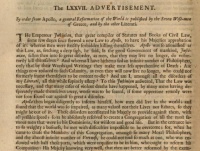Trajano Boccalini
From The Art and Popular Culture Encyclopedia

|
"Those who deny that Boccalini wrote the "La Pietra di Parrangone, ” say too much. The style of this book is the same with that of the "Ragguagli di Parnasso. ” He was the Lucian of Italy. His death was deplorable . He was beaten to death by some Spaniards with sand-bags, an instrument of vengeance introduced by the Italians, which produce a mortification by the wounds they give; occasion no blood-shed, and give fatal blows. The two tracts of Boccalini, entitled “Ragguagli di Parnasso” and “ La Pietra di Parrangone,” were translated by Henry Earl of Monmouth, and edited for the second time, 1669, London , folio. He terms these two essays “Advertisements from Parnassus" and the “Politic Touchstone." This witty Italian author seems little known, though his satiric observations on men, books, and things, entitle him to the perusal of every reader of taste and learning. In the Advertisements from Parnassus, much political are mixed with literary notices."--The French Anas |
|
Related e |
|
Featured: |
Trajano Boccalini (1556 - 1613) was an Italian writer and satirist. A large part of his writings are collected in Advertisements from Parnassus in Two Centuries with the Politick Touch-stone (1674).
Life
The son of an architect, he himself adopted that profession, and it appears that he commenced late in life to apply to literary pursuits. Pursuing his studies at Rome, he had the honor of teaching Bentivoglio, and acquired the friendship of the cardinals Gaetano and Borghesi, as well as of other distinguished personages. By their influence he obtained various posts, and was even appointed (by Gregory XIII) governor of Benevento in the states of the church. Here, however, he seems to have acted imprudently, and he was soon recalled to Rome, where he shortly afterwards composed his most important work, the Ragguagli di Parnaso (News-sheet from Parnassus), in which Apollo is represented as receiving the complaints of all who present themselves, and distributing justice according to the merits of each particular case. The book is full of light and fantastic satire on the actions and writings of his eminent contemporaries, and some of its happier hits are among the hackneyed felicities of literature.
To escape, it is said, from the hostility of those whom his shafts had wounded, he returned to Venice, and there, according to the register in the parochial church of Santa Maria Formosa, died of colic accompanied with fever on November 16, 1613. It was asserted by contemporary writers that he had been beaten to death with sand-bags by a band of Spanish bravadoes, but the story seems without foundation. At the same time, it is evident from the Pietra del Paragone, which appeared in 1615 after his death, that whatever the feelings of the Spaniards towards him, he cherished against them feelings of the bitterest hostility. The only government which was exempt from his attacks is that of Venice, a city for which he seems to have had a special affection.
The Ragguagli, first printed in 1612, has frequently been republished. The Pietra has been translated into French, German, English and Latin; the English translator was Henry, Earl of Monmouth, his version being entitled The Politicke Touchstone (London, 1674).
Another posthumous publication of Boccalini was his Commentarii sopra Cornelio Tacito (Geneva, 1669). Many of his manuscripts are preserved still unprinted.
Linking in as of 2022
1610s, 1612 in literature, 1613 in literature, 1613 in poetry, 1613, Christopher Besoldus, Cultural depictions of Maximilian I, Holy Roman Emperor, Divide and rule, Fama Fraternitatis, Italian nationalism, Louis Giry, Mario Equicola, November 16, Scrittori d'Italia Laterza, Verdussen family
See also

